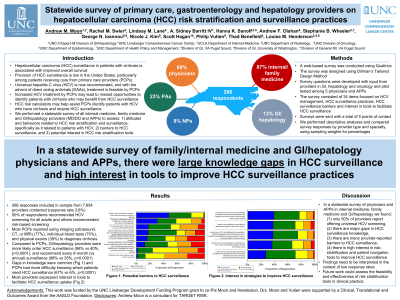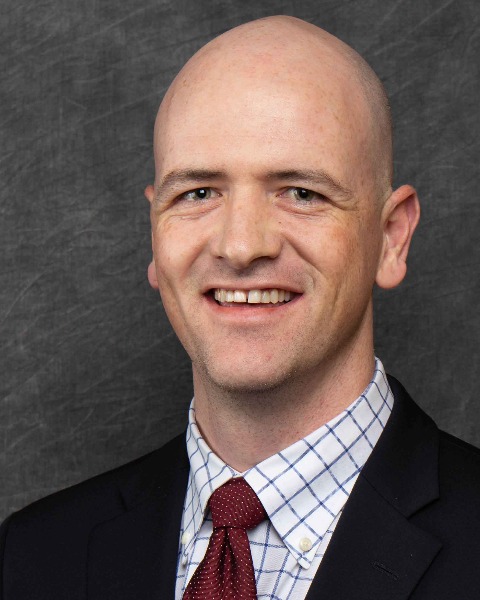Tuesday Poster Session
Category: Liver
P3780 - Statewide Survey of Primary Care, Gastroenterology, and Hepatology Providers on Hepatocellular Carcinoma Risk Stratification and Surveillance Practices
Tuesday, October 24, 2023
10:30 AM - 4:00 PM PT
Location: Exhibit Hall

Has Audio

Andrew M. Moon, MD, MPH
University of North Carolina Chapel Hill
Chapel Hill, NC
Presenting Author(s)
Andrew M. Moon, MD, MPH1, Rachel Swier, MD2, Lindsay Lane, MPH2, A. Sidney Barritt, MD, MSCR2, Hanna Sanoff, MD, MPH2, Andrew Olshan, PhD2, Stephanie Wheeler, PhD, MPH2, George Ioannou, MD, MS3, Nicole Kim, MD4, Scott Hagan, MD3, Philip Vutien, MD4, Thad Benefield, MS2, Louise Henderson, PhD, MSPH2
1University of North Carolina Chapel Hill, Chapel Hill, NC; 2University of North Carolina, Chapel Hill, NC; 3University of Washington; VA Puget Sound, Seattle, WA; 4University of Washington, Seattle, WA
Introduction: Hepatocellular carcinoma (HCC) surveillance in patients with cirrhosis is associated with increased survival. Provision of HCC surveillance is low in the US, particularly among patients seen only in primary care (PCP) settings. To evaluate current HCC risk stratification and surveillance practices, we conducted a statewide survey of family medicine (FM), internal medicine (IM), gastroenterology (GI) and hepatology providers in North Carolina (NC).
Methods: We developed and pilot tested a survey on HCC risk stratification and surveillance. Using the NC Health Professionals Data System, we identified all physicians, PAs and NPs actively practicing in FM, IM, GI or hepatology in NC. We used the Tailored Design Approach to send emails (NPs) or letters (PAs, MD/DOs) inviting providers to complete an online survey with up to 5 points of contact and a drawing for an iPad as an incentive. Tabulations were weighted to represent the larger population using statistical software to adjust for sampling weights (SAS, V9.4, Cary, NC). We performed chi-square tests to compare survey responses between FM/IM and GI/hepatology.
Results: 7,654 providers were contacted and 290 responded (response rate 4%). Most respondents were physicians (68%), followed by PAs (24%) and NPs (8%). The most common specialty was FM (50%) followed by IM (31%) and GI/hepatology (11%). Among FM or IM, the top methods for identifying cirrhosis were ultrasound, CT, or MRI (75%), labs (62%), physical exams (35%), and transient elastography (30%). Compared to FM/IM providers, GI/hepatology providers were more likely to report performing any HCC surveillance (98% vs 39%, p< 0.0001), ordering serum AFP (in addition to US) (58% vs 37%, p=0.028) and performing q6 mo (vs annual) surveillance (98% vs 35%, p< 0.0001). There were several reported barriers to HCC surveillance (Figure 1A). Most respondents believed there was strong data to support HCC surveillance but did not know which liver disease patients needed screening and which patients had cirrhosis. Most expressed interest in potential solutions to improve HCC risk stratification/surveillance (Figure 1B).
Discussion: In this statewide survey, most respondents reported a lack of knowledge about who needed HCC surveillance and expressed interest in strategies to improve HCC surveillance including an HCC risk dashboard and electronic risk calculators. After further validation and testing, such tools may help improve low HCC surveillance rates in patients with cirrhosis.

Disclosures:
Andrew M. Moon, MD, MPH1, Rachel Swier, MD2, Lindsay Lane, MPH2, A. Sidney Barritt, MD, MSCR2, Hanna Sanoff, MD, MPH2, Andrew Olshan, PhD2, Stephanie Wheeler, PhD, MPH2, George Ioannou, MD, MS3, Nicole Kim, MD4, Scott Hagan, MD3, Philip Vutien, MD4, Thad Benefield, MS2, Louise Henderson, PhD, MSPH2. P3780 - Statewide Survey of Primary Care, Gastroenterology, and Hepatology Providers on Hepatocellular Carcinoma Risk Stratification and Surveillance Practices, ACG 2023 Annual Scientific Meeting Abstracts. Vancouver, BC, Canada: American College of Gastroenterology.
1University of North Carolina Chapel Hill, Chapel Hill, NC; 2University of North Carolina, Chapel Hill, NC; 3University of Washington; VA Puget Sound, Seattle, WA; 4University of Washington, Seattle, WA
Introduction: Hepatocellular carcinoma (HCC) surveillance in patients with cirrhosis is associated with increased survival. Provision of HCC surveillance is low in the US, particularly among patients seen only in primary care (PCP) settings. To evaluate current HCC risk stratification and surveillance practices, we conducted a statewide survey of family medicine (FM), internal medicine (IM), gastroenterology (GI) and hepatology providers in North Carolina (NC).
Methods: We developed and pilot tested a survey on HCC risk stratification and surveillance. Using the NC Health Professionals Data System, we identified all physicians, PAs and NPs actively practicing in FM, IM, GI or hepatology in NC. We used the Tailored Design Approach to send emails (NPs) or letters (PAs, MD/DOs) inviting providers to complete an online survey with up to 5 points of contact and a drawing for an iPad as an incentive. Tabulations were weighted to represent the larger population using statistical software to adjust for sampling weights (SAS, V9.4, Cary, NC). We performed chi-square tests to compare survey responses between FM/IM and GI/hepatology.
Results: 7,654 providers were contacted and 290 responded (response rate 4%). Most respondents were physicians (68%), followed by PAs (24%) and NPs (8%). The most common specialty was FM (50%) followed by IM (31%) and GI/hepatology (11%). Among FM or IM, the top methods for identifying cirrhosis were ultrasound, CT, or MRI (75%), labs (62%), physical exams (35%), and transient elastography (30%). Compared to FM/IM providers, GI/hepatology providers were more likely to report performing any HCC surveillance (98% vs 39%, p< 0.0001), ordering serum AFP (in addition to US) (58% vs 37%, p=0.028) and performing q6 mo (vs annual) surveillance (98% vs 35%, p< 0.0001). There were several reported barriers to HCC surveillance (Figure 1A). Most respondents believed there was strong data to support HCC surveillance but did not know which liver disease patients needed screening and which patients had cirrhosis. Most expressed interest in potential solutions to improve HCC risk stratification/surveillance (Figure 1B).
Discussion: In this statewide survey, most respondents reported a lack of knowledge about who needed HCC surveillance and expressed interest in strategies to improve HCC surveillance including an HCC risk dashboard and electronic risk calculators. After further validation and testing, such tools may help improve low HCC surveillance rates in patients with cirrhosis.

Figure: Figure 1. Responses to survey questions regarding potential barriers to HCC surveillance (1A) and interest in strategies to improve HCC surveillance (1B)
Disclosures:
Andrew Moon: TARGET RWE – Consultant.
Rachel Swier indicated no relevant financial relationships.
Lindsay Lane indicated no relevant financial relationships.
A. Sidney Barritt: Abbott – Consultant. Merck – Consultant. TARGET RWE – Consultant.
Hanna Sanoff: Amgen – Grant/Research Support. AstraZeneca – Grant/Research Support. BioMed Valley Discoveries – Grant/Research Support. Bristol-Myers Squibb – Grant/Research Support. Exelixis – Grant/Research Support. F Hoffman La Roche – Grant/Research Support. Pfizer – Grant/Research Support. Rgenix – Grant/Research Support.
Andrew Olshan indicated no relevant financial relationships.
Stephanie Wheeler indicated no relevant financial relationships.
George Ioannou indicated no relevant financial relationships.
Nicole Kim indicated no relevant financial relationships.
Scott Hagan indicated no relevant financial relationships.
Philip Vutien indicated no relevant financial relationships.
Thad Benefield indicated no relevant financial relationships.
Louise Henderson indicated no relevant financial relationships.
Andrew M. Moon, MD, MPH1, Rachel Swier, MD2, Lindsay Lane, MPH2, A. Sidney Barritt, MD, MSCR2, Hanna Sanoff, MD, MPH2, Andrew Olshan, PhD2, Stephanie Wheeler, PhD, MPH2, George Ioannou, MD, MS3, Nicole Kim, MD4, Scott Hagan, MD3, Philip Vutien, MD4, Thad Benefield, MS2, Louise Henderson, PhD, MSPH2. P3780 - Statewide Survey of Primary Care, Gastroenterology, and Hepatology Providers on Hepatocellular Carcinoma Risk Stratification and Surveillance Practices, ACG 2023 Annual Scientific Meeting Abstracts. Vancouver, BC, Canada: American College of Gastroenterology.
